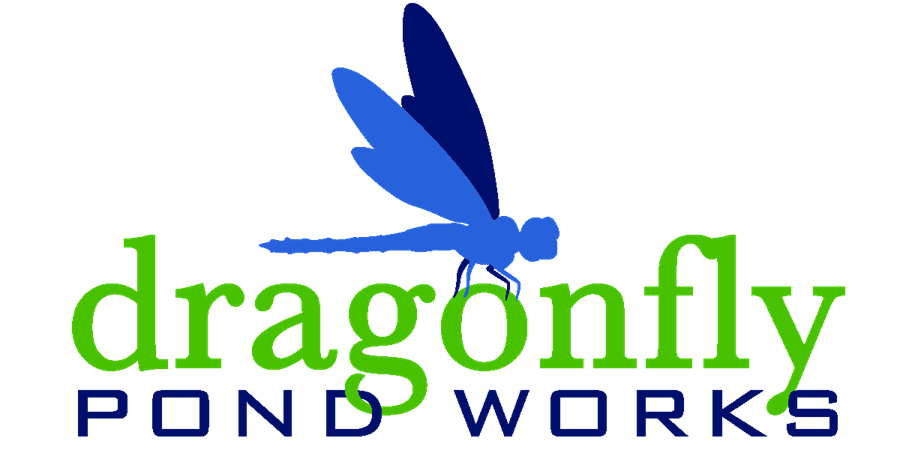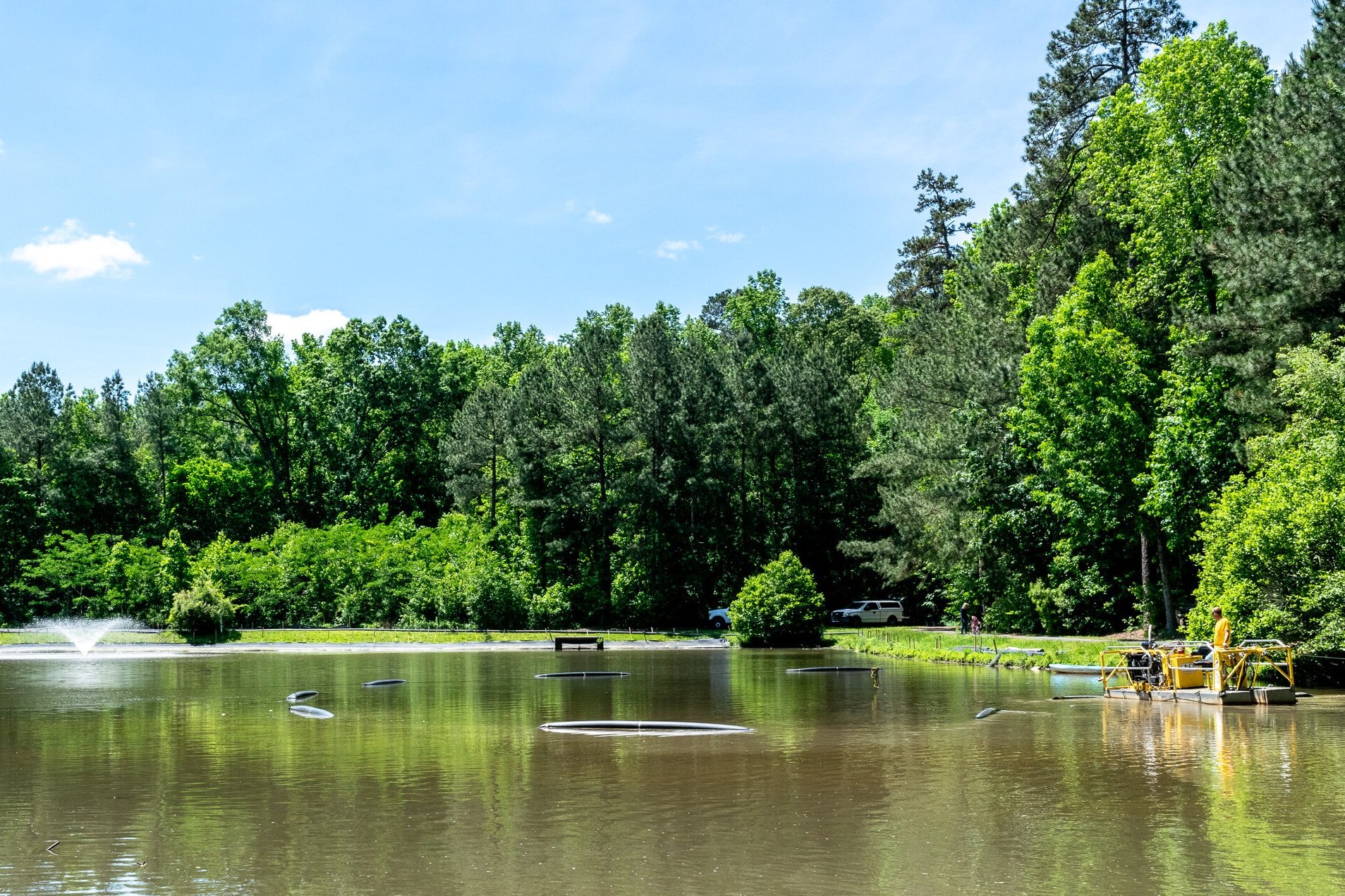Lake & Pond Dredging in Atlanta: What Every HOA Community Should Know
Lake and pond dredging in Atlanta helps HOA communities restore depth, improve water quality, and prevent costly damage. In this article, our experts explain how to spot sediment buildup and choose the right dredging solution for your pond or lake.
Restore Depth, Beauty, and Function to Your Community Water Features
In Atlanta-area HOA communities, ponds and lakes do more than beautify the neighborhood—they support property value, recreation, wildlife, and in many cases, stormwater management. But as years pass, sediment builds up, water quality declines, and once-pristine community amenities start causing problems.
If your HOA lake or pond is shallower than it used to be, suffering from algae blooms, or failing to drain properly, it might be time to consider lake and pond dredging in Atlanta. In this blog, we’ll explain what causes sediment buildup, how to recognize the signs, and why Dragonfly Pond Works is the trusted expert for sediment removal services in Atlanta and beyond.
What Causes Sediment Buildup in Lakes and Ponds?
Whether your pond was built for stormwater control or simply as a community feature, sediment accumulation is inevitable. In the Atlanta area, this happens due to:
Erosion from surrounding landscapes
Runoff carrying soil and debris
Decomposing organic material
Development upstream or nearby
Infrequent or delayed maintenance
Over time, sediment settles at the bottom of the waterbody, gradually reducing its depth and disrupting its function—sometimes without anyone noticing until it’s too late.
Signs Your Atlanta HOA Pond or Lake May Need Dredging
Not sure if your pond is due for maintenance? Here are common indicators that your community may need sediment removal services in Atlanta:
Shallower water depth – If the pond seems to be “filling in’’, sediment accumulation is the likely cause
Algae blooms and excessive vegetation – Sediment often carries nutrients that fuel unwanted growth
Odors or murky water – Poor water circulation and decay can lead to unpleasant smells and cloudy water
Drainage issues or flooding – Stormwater ponds can lose capacity, increasing flood risk during heavy rains
Eroded or unstable shorelines – Sediment runoff often starts with shoreline degradation
Why Sediment Removal Is Essential: More Than Just Looks
While the aesthetic impact of a murky, shallow pond is easy to notice, the consequences of sediment buildup go far beyond appearance. Removing excess sediment restores proper depth and water flow, which is essential for maintaining a healthy aquatic environment. It also improves water quality, helps reduce algae blooms, and enhances conditions for fish and other wildlife. By addressing sediment accumulation, communities can protect against shoreline erosion and prevent localized flooding caused by decreased water storage capacity. Dredging also plays a vital role in preserving long-term property value and ensuring compliance with stormwater best management practices (BMPs). For HOA board members and community managers, taking proactive steps toward dredging is an investment that improves resident satisfaction and avoids more expensive repairs down the line.
Dredging Methods: What Are Your Options?
At Dragonfly Pond Works, we customize dredging solutions based on each site’s needs. There are two primary methods we use for lake and pond dredging in Atlanta:
Mechanical Dredging
Heavy equipment like excavators and dump trucks are used to scoop out and haul away sediment, often requiring dewatering and partial pond draining.
Best for:
Severe sediment buildup
Projects requiring structural changes
Sites with good access and space for staging
Pros:
Fast sediment removal
Cost-effective for large-scale work
Cons:
Can disturb surroundings
Requires more space and site access
Hydraulic Dredging
A low-impact dredge pumps sediment through hoses to dewatering bags without needing to drain the pond.
Best for:
HOA ponds in residential areas
Sites with limited access or where impact needs to be minimal
Projects focused on aesthetics or water quality
Pros:
Minimal disruption to the site and residents
Maintains aquatic habitat
Excellent for targeted sediment removal
Cons:
Less effective for heavy clay or leafy debris
May be more costly than mechanical dredging
Whether it’s mechanical or hydraulic, a qualified contractor will determine the best solution based on sediment type, location, access, and goals.
Why HOAs Trust Dragonfly Pond Works: Top Dredging Contractors for Atlanta Communities
At Dragonfly Pond Works, we specialize in lake and pond dredging for communities just like yours. As experienced dredging contractors for HOAs, we understand the unique needs of HOA waterbodies—balancing function, aesthetics, and minimal disruption to residents. Our team provides comprehensive services that include professional assessments and sediment surveys, permitting guidance, and regulatory compliance support. We tailor each project with customized mechanical or hydraulic dredging solutions based on the site’s conditions and goals. Our approach also includes environmentally responsible sediment handling, and when needed, shoreline restoration and erosion repair. Across Atlanta, Gwinnett County, and the surrounding areas, we’ve helped hundreds of HOAs safely and effectively restore the health and beauty of their ponds and lakes.
Don’t Wait—Restore Your Atlanta HOA Lake or Pond Today
If your HOA pond is showing signs of sediment buildup, now is the time to act. Waiting too long can turn a small problem into a major, costly repair. Dragonfly Pond Works is ready to help you take the next step toward protecting your investment and enhancing your community’s environment.
Contact our team today for a professional assessment and customized plan for lake and pond dredging solutions in Atlanta.
FAQ: Lake and Pond Dredging in Atlanta
How often should HOA ponds be dredged?
Most ponds need dredging every 10–20 years, depending on runoff, erosion, and maintenance history.
Do we need a permit for dredging?
In many cases, yes. We handle the permitting process as part of our service.
Is dredging disruptive to residents?
Our low-impact hydraulic methods minimize noise, mess, and downtime—perfect for HOA communities.
Can the dredged sediment be reused?
Yes! We often use dredged sediment to rebuild shorelines or stabilize eroded areas.
Dragonfly Pond Works: Your Partner for Lake and Pond Dredging in Atlanta & Beyond
Sediment problems don’t solve themselves. If your community’s pond or lake isn’t performing like it used to, Dragonfly Pond Works has the expertise and equipment to restore it. As your go-to dredging contractors for HOAs, we bring peace of mind, compliance assurance, and beautiful results to Atlanta communities.
Contact us today to schedule a pond or lake assessment.
Let’s bring your water features back to life.
Atlanta Pond & Lake Dredging, Stormwater Pond Repairs, Routine Maintenance, & More
Learn about our specialized stormwater pond and BMP maintenance and mowing programs. See a stormwater pipe repair case study showcasing our BMP repair capabilities available across Atlanta and all of Gwinnett County.
Subscribe to our newsletter to receive informative and engaging news delivered right to your inbox.
Find us on Facebook, Twitter, Instagram, and LinkedIn for news, events, and more!
Dragonfly Pond Works provides dredging, dry detention basin reconstruction, compliance repairs, maintenance, mowing, and more in Gwinnett County, Atlanta, Athens, Savannah, Georgia, Easley, Greenville, Spartanburg, Columbia, Charleston, Myrtle Beach, South Carolina, Raleigh, Durham, Charlotte, Greensboro, and Wilmington, North Carolina, Tampa, Sarasota, Orlando, Fort Myers, Florida, Atlanta, Athens, Georgia, DC Metro, Alexandria, Arlington, Fairfax, Northern Virginia, and Rockville, Gaithersburg, and surrounding Montgomery County, Maryland.





